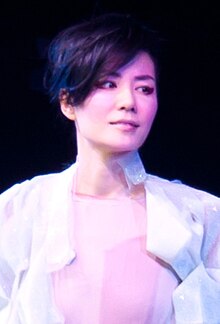Faye Wong | |||||||||||||
|---|---|---|---|---|---|---|---|---|---|---|---|---|---|
王菲 | |||||||||||||
 Wong in 2011 | |||||||||||||
| Born | Xia Lin [fn 1] 8 August 1969 Dongcheng, Beijing, China | ||||||||||||
| Citizenship | Chinese (Hong Kong) | ||||||||||||
| Occupations |
| ||||||||||||
| Years active |
| ||||||||||||
| Spouses | |||||||||||||
| Partner |
| ||||||||||||
| Children | Leah Dou Li Yan | ||||||||||||
| Musical career | |||||||||||||
| Also known as | Shirley Wong (王靖雯) | ||||||||||||
| Origin | Hong Kong | ||||||||||||
| Genres | |||||||||||||
| Labels | |||||||||||||
| Chinese name | |||||||||||||
| Chinese | 王菲 | ||||||||||||
| |||||||||||||
| Stage name | |||||||||||||
| Chinese | 王靖雯 | ||||||||||||
| |||||||||||||
| Birth name | |||||||||||||
| Chinese | 夏林 | ||||||||||||
| |||||||||||||
Faye Wong (Chinese: 王菲; pinyin: Wáng Fēi; born on 8 August 1969) is a Chinese singer-songwriter and actress. Early in her career she briefly used the stage name Shirley Wong (王靖雯). Born in Beijing, she moved to Hong Kong at the age of 18. She debuted with the Cantonese album Shirley Wong in 1989 and came to public attention by combining alternative music with mainstream Chinese pop.[2] Since 1994, she has recorded mostly in her native Mandarin.
One of the biggest pop stars in the Chinese-speaking world, Wong has also gained followings in Japan and Southeast Asia. In the West she is perhaps best known for starring in Wong Kar-wai's films Chungking Express (1994) and 2046 (2004).[2][3] While she has collaborated with international acts such as Cocteau Twins, Wong has recorded only a few songs in English, including "Eyes on Me" (1999), the theme song of the video game Final Fantasy VIII (1999). Upon her second marriage in 2005, she withdrew from the limelight, though sporadically returned to the stage.[4][5]
Wong is known to be a "diva with few words" in public, and has gained a reputation for her "cool" personality.[6][7] In Encyclopedia of Contemporary Chinese Culture, Jeroen de Kloet characterised her as "singer, actress, mother, celebrity, royalty, sex symbol and diva all at the same time".[8] In 2000, she was recognised by Guinness World Records as the best selling Cantopop female artist, having sold an estimated 9.7 million copies of her albums by March 2000.[9]
- ^ Huang Xiaoyang (黄晓阳) (2005). 王菲画传 [A Pictorial Biography of Faye Wong] (in Chinese). China Radio & Television Publishing House. ISBN 978-7-5043-4429-8. Archived from the original on 20 December 2009. Retrieved 1 April 2011.
- ^ a b Mitchell, Tony (2006). "Chapter 13: Tian Ci – Faye Wong and English Songs in the Cantopop and Mandopop Repertoire". In Homan, Shane (ed.). Access All Eras: Tribute Bands and Global Pop Culture. Open University Press. pp. 215–228. ISBN 0-335-21690-0. Retrieved 4 February 2011.
- ^ Huang Yan; Blanchard, Ben (26 July 2010). "China's Pop Queen Faye Wong Plans Comeback". Reuters. Retrieved 23 January 2011.
- ^ Sun Xi (5 November 2010). "Return of the Inimitable Faye Wong". Women of China. Archived from the original on 10 August 2017. Retrieved 23 January 2011.
- ^ "Faye Wong Moments Live 2016 delights Shanghai[3]- Chinadaily.com.cn". www.chinadaily.com.cn. Retrieved 17 March 2024.
- ^ Smith, Jeff; Wylie, Jean (2004). Smyth, Russell; Tam, On Kit; Warner, Malcolm; Jiuhua Zhu, Cherrie (eds.). China's Business Reforms. Vol. 7. US-China Business Council. doi:10.4324/9780203537039. ISBN 978-0203537039. Archived from the original on 8 July 2011. Retrieved 23 January 2011.
The April 2004 'China Cool Hunt' survey polled 1,200 18- to 22-year-old students from 64 universities in Beijing and Shanghai about the who, what, and why of cool ... Asian, not Western, musicians are viewed as cool by this generation. No international pop stars were among students' top 10 favorites. China's Wang Fei was the most popular singer, with 17 percent of the votes.
{{cite book}}:|journal=ignored (help) - ^ 上海電台選最酷藝人, 王菲應份得獎 [Faye Wong fittingly wins Shanghai radio station's 'Coolest Celebrity Award']. Apple Daily (in Chinese). 16 July 1999. Archived from the original on 2 October 2011. Retrieved 1 April 2011.
- ^ de Kloet, Jeroen (2005). "Wong Fei". In Edward L., Davis (ed.). Encyclopedia of Contemporary Chinese Culture. Routledge. pp. 659–660. ISBN 0-415-24129-4. Retrieved 19 April 2013.
- ^ "Best Selling Canto-Pop Female". Guinness World Records. Archived from the original on 23 March 2005. Retrieved 23 January 2011.
Cite error: There are <ref group=fn> tags on this page, but the references will not show without a {{reflist|group=fn}} template (see the help page).